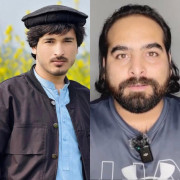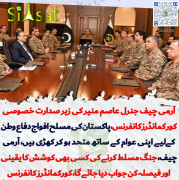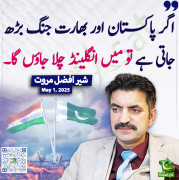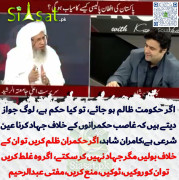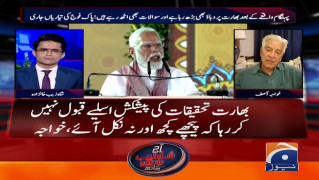awan4ever
Chief Minister (5k+ posts)
Moby Dick of strategic depth
by Farooq Sulehria

Old Eskimos had a clever technique for hunting wolves. They would plant a bloody knife in the snow. Lured by the smell of blood, the wolves would approach the knife and lick the blade, cutting their tongues. Without realizing that they were drinking their own blood, wolves would continue licking until they had bled to death.
The strategic depth doctrine Pakistan's military adopted back in 1980s, is proving Eskimos'knife for Pakistan. In the first place, this imperialist doctrine is ethically as repugnant as US occupation of Afghanistan. What is even dangerous about Moby Dick of strategic depth our Khaki Captain Ahabs are chasing, is the inability of Pequod (Taliban) to cast anchor at Kabul. Back in 1997, objective conditions favoured GHQ-sponsored Taliban's seizure of Kabul. It remains Pakistan military's sole victory at an external front. A disinterested USA welcomed Taliban's arrival in Kabul. To quote New York Times, the ''State Department was touting the Taliban as the group that might finally bring stability''. A US diplomat, Jon Holtzman, was advised to visit Kabul. Trip was, however, cancelled after media kerfuffle about women rights. Still $125 million were granted in aid ( largest foreign aid). The State Department maintained secret correspondence with Taliban regime. At the time, media were replete with rumours regarding US-backing for Taliban. Unlike the anti-US image Taliban have cultivated in recent years, they were also pretty cozy with infidel Uncle Sam. The US rationale for Taliban support was not merely an over-publicised gas pipeline project that Unocal wanted to pursue. Clinton Administration, it was rumoured, had Iran in mind while welcoming Taliban. Whether these rumours were true or not, Taliban's second major sponsor, Riyadh, definitely wanted to contain Iran through staunchly anti-Shia Taliban. Thus, all three infamous As that matter in Pakistan i.e. Army, America and Allah (represented here by Riyadh here) were united in seeking, by default, cherished strategic depth. Equally important was the turmoil in Russia and Central Asian Republics (CARs). Following the Soviet dissolution, new regimes in Russia and CARs were struggling to consolidate. Most importantly, Afghans were desperate for peace after years of brutal infighting among Mujahideen gangs. Hoping against hope, at least a section of Afghans pinned their hopes in Taliban even if it meant sacrificing civil liberties.
Fifteen years on, odds are stubbornly going against Taliban. The USA is not merely on the other side of the fence, it in fact is guarding (no matter how unsuccessfully) the fence. Saudi royals, one of them personally humiliated by Mullah Omar on the question of Osama's expulsion, would find it imprudent to annoy Washington by patronising Taliban. Regimes in CARs and Russia, dealing with confessional militancy, would not sit idle in the face of Taliban take over of Kabul. Pakistan's all-weather friend China, facing Uighur uprising, has publicly expressed her disapproval of Taliban. Most importantly, big majority of Afghans, particularly non-Pakhtuns constituting almost 55 percent of the population, having lived Taliban nightmare are not ready to experience it one more time. Though Pakistan's media Mujahideen have pretty successfully painted Taliban as popular peace-harbingers ( in 90s) and popular liberation force (2001 onwards) yet Afghan perception of Taliban is different. Opinion polls find Taliban's popularity below ten percent. Hence, Taliban march on Kabul, by proxy providing strategic depth to Pakistan, may not be resisted by the USA, Iran, India, China, CARs and Russia but by most Afghans including Pakhtuns. Most likely, unable to recapture Kabul, Taliban would march on Islamabad. Indications are already there. Thus Islamabad instead of reaching strategic depth, will most likely embrace a strategic death.
http://www.viewpointonline.net/moby-dick-of-strategic-depth/Print.html
by Farooq Sulehria

Old Eskimos had a clever technique for hunting wolves. They would plant a bloody knife in the snow. Lured by the smell of blood, the wolves would approach the knife and lick the blade, cutting their tongues. Without realizing that they were drinking their own blood, wolves would continue licking until they had bled to death.
The strategic depth doctrine Pakistan's military adopted back in 1980s, is proving Eskimos'knife for Pakistan. In the first place, this imperialist doctrine is ethically as repugnant as US occupation of Afghanistan. What is even dangerous about Moby Dick of strategic depth our Khaki Captain Ahabs are chasing, is the inability of Pequod (Taliban) to cast anchor at Kabul. Back in 1997, objective conditions favoured GHQ-sponsored Taliban's seizure of Kabul. It remains Pakistan military's sole victory at an external front. A disinterested USA welcomed Taliban's arrival in Kabul. To quote New York Times, the ''State Department was touting the Taliban as the group that might finally bring stability''. A US diplomat, Jon Holtzman, was advised to visit Kabul. Trip was, however, cancelled after media kerfuffle about women rights. Still $125 million were granted in aid ( largest foreign aid). The State Department maintained secret correspondence with Taliban regime. At the time, media were replete with rumours regarding US-backing for Taliban. Unlike the anti-US image Taliban have cultivated in recent years, they were also pretty cozy with infidel Uncle Sam. The US rationale for Taliban support was not merely an over-publicised gas pipeline project that Unocal wanted to pursue. Clinton Administration, it was rumoured, had Iran in mind while welcoming Taliban. Whether these rumours were true or not, Taliban's second major sponsor, Riyadh, definitely wanted to contain Iran through staunchly anti-Shia Taliban. Thus, all three infamous As that matter in Pakistan i.e. Army, America and Allah (represented here by Riyadh here) were united in seeking, by default, cherished strategic depth. Equally important was the turmoil in Russia and Central Asian Republics (CARs). Following the Soviet dissolution, new regimes in Russia and CARs were struggling to consolidate. Most importantly, Afghans were desperate for peace after years of brutal infighting among Mujahideen gangs. Hoping against hope, at least a section of Afghans pinned their hopes in Taliban even if it meant sacrificing civil liberties.
Fifteen years on, odds are stubbornly going against Taliban. The USA is not merely on the other side of the fence, it in fact is guarding (no matter how unsuccessfully) the fence. Saudi royals, one of them personally humiliated by Mullah Omar on the question of Osama's expulsion, would find it imprudent to annoy Washington by patronising Taliban. Regimes in CARs and Russia, dealing with confessional militancy, would not sit idle in the face of Taliban take over of Kabul. Pakistan's all-weather friend China, facing Uighur uprising, has publicly expressed her disapproval of Taliban. Most importantly, big majority of Afghans, particularly non-Pakhtuns constituting almost 55 percent of the population, having lived Taliban nightmare are not ready to experience it one more time. Though Pakistan's media Mujahideen have pretty successfully painted Taliban as popular peace-harbingers ( in 90s) and popular liberation force (2001 onwards) yet Afghan perception of Taliban is different. Opinion polls find Taliban's popularity below ten percent. Hence, Taliban march on Kabul, by proxy providing strategic depth to Pakistan, may not be resisted by the USA, Iran, India, China, CARs and Russia but by most Afghans including Pakhtuns. Most likely, unable to recapture Kabul, Taliban would march on Islamabad. Indications are already there. Thus Islamabad instead of reaching strategic depth, will most likely embrace a strategic death.
http://www.viewpointonline.net/moby-dick-of-strategic-depth/Print.html

